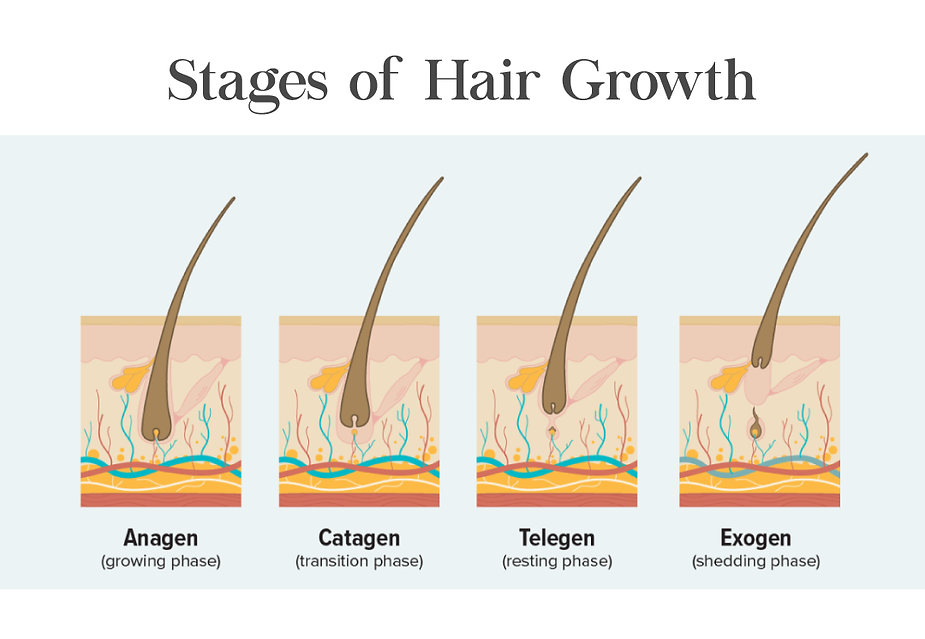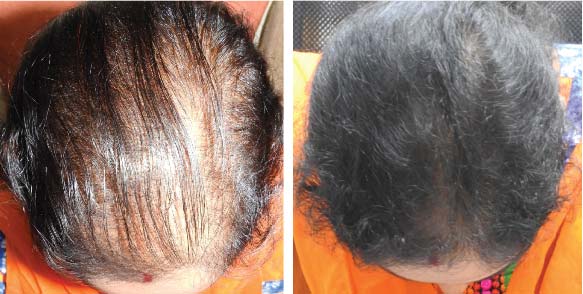Hair fall is a common issue that many men face at some point in their lives. From genetics to lifestyle factors, there are various reasons why men experience hair loss. While it's normal to shed a few strands daily, excessive hair fall can be distressing and may affect a man's confidence. This blog will dive deep into the causes of hair fall in men, the best treatment options available, and simple yet effective ways to prevent further loss.
Understanding Hair Fall in Men
Hair fall, also known as male pattern baldness or androgenic alopecia, is a condition in which men experience thinning or loss of hair, especially from the crown and temples. While hair loss is often associated with aging, men as young as in their 20s may start noticing signs of it.
There are several types of hair loss, but the most common one among men is androgenic alopecia. This type of hair loss follows a predictable pattern and is primarily due to genetics and hormonal changes.
Stages of Hair Fall in Men
Hair loss in men can be classified using the Norwood scale, which outlines the stages of male pattern baldness:
- Stage 1: No noticeable hair loss.
- Stage 2: Slight recession of the hairline at the temples.
- Stage 3: The hairline has receded further and thinning occurs on the crown.
- Stage 4: More pronounced hair loss at the temples and crown.
- Stage 5: The bridge of hair remains, but there is significant thinning.
- Stage 6: The hair on the crown and temples is severely thinning.
- Stage 7: Only a band of hair remains on the sides of the head.
Hair Growth Cycle
Understanding the hair growth cycle is essential to grasping why hair fall occurs. The cycle consists of three main phases:
- Anagen Phase: The active growth phase, lasting 2-7 years.
- Catagen Phase: The transitional phase lasting 2-3 weeks, where hair stops growing and the follicle shrinks.
- Telogen Phase: The resting phase lasting 3-4 months, where hair falls out, and new hair begins to grow.

Image showing the hair growth cycle (Anagen, Catagen, Telogen phases)
Common Causes of Hair Fall in Men
Several factors can contribute to hair fall in men, ranging from genetics to environmental influences. Let's take a closer look at these causes:
- Genetics (Hereditary Hair Loss): One of the most common reasons for hair fall in men is genetics. If your father, grandfather, or other close relatives experienced hair loss at an early age, chances are you might too. Genetic hair loss typically results in male pattern baldness, which starts at the temples and the crown of the head, eventually leading to a receding hairline.
- Hormonal Imbalances: Hormonal changes, specifically the increase in a hormone called dihydrotestosterone (DHT), can play a significant role in hair loss. DHT is a derivative of testosterone and is known to shrink hair follicles, making it difficult for hair to grow. Over time, this leads to shorter, finer hair and eventually baldness.
- Stress and Lifestyle Factors: Stress is a well-known contributor to hair fall. Physical and emotional stress can trigger a condition called telogen effluvium, where more hairs than usual enter the resting phase of the hair growth cycle and fall out prematurely. Major life events, illness, or sudden weight loss can also lead to increased hair shedding.
- Poor Nutrition: A diet lacking in essential nutrients such as proteins, vitamins, and minerals can cause hair loss. Nutrients like biotin, vitamin D, and iron are vital for maintaining healthy hair. Without a balanced diet, hair growth can be affected, leading to thinning or shedding.
- Hair Treatments and Products: Excessive use of styling products, hair dyes, or harsh chemical treatments can weaken hair strands and lead to breakage or hair fall. Additionally, frequent use of heat tools such as straighteners and curling irons can damage the hair shaft, causing split ends and thinning.
- Medical Conditions and Medications: Certain medical conditions like thyroid disorders, autoimmune diseases, and scalp infections can contribute to hair loss. Moreover, medications for conditions such as depression, high blood pressure, or cancer treatments (like chemotherapy) are known to cause hair shedding.
Effective Treatments for Hair Fall in Men
Fortunately, there are various treatment options available for men experiencing hair fall. Some are simple home remedies, while others involve medical or surgical interventions. Below are some popular treatments:
1. Over-the-Counter Products: Minoxidil (Rogaine): A topical solution applied directly to the scalp. It helps to stimulate hair growth and slow down hair loss. Minoxidil is available without a prescription and can be used regularly for noticeable improvements.
Finasteride (Propecia): An oral medication that reduces the levels of DHT in the scalp, slowing hair loss and encouraging regrowth. This drug requires a prescription from a doctor.
2. Hair Transplant Surgery: For men with more advanced hair loss, hair transplant surgery is an effective option. During this procedure, hair follicles are taken from the back or sides of the head (areas with more hair) and transplanted to the balding areas. Hair transplants can offer long-lasting results, but they can be expensive and require recovery time.
3. Low-Level Laser Therapy (LLLT): Laser therapy is another non-invasive treatment that stimulates hair growth using low-level lasers. These lasers increase blood flow to the scalp, promoting hair follicle growth and reducing thinning. LLLT can be used at home with specially designed laser combs or caps.
4. Scalp Micropigmentation (SMP): For men who want to create the appearance of thicker hair without undergoing surgery, scalp micropigmentation is a popular cosmetic procedure. This technique involves tattooing tiny dots on the scalp to mimic the look of closely shaved hair or a fuller hairline.
5. Platelet-Rich Plasma (PRP) Therapy: PRP therapy involves drawing a small amount of the patient's blood, processing it to concentrate the platelets, and injecting it back into the scalp. The growth factors in the plasma promote healing and stimulate hair follicles, encouraging hair growth.
6. GFC (Growth Factor Concentrate) Treatment: GFC revitalizes hair follicles to promote growth and improve hair thickness.
7. QR678 Hair Cocktails: A non-invasive treatment that helps with hair regrowth and enhances hair health through a cocktail of growth factors.
8. Microneedling: This enhances the absorption of topical treatments and stimulates hair follicles.
9. Anti-Dandruff Treatments: Addressing scalp issues that may contribute to hair fall.
10. Keravive: A treatment designed to cleanse, exfoliate, and nourish the scalp for optimal hair growth.

Before/After images of GFC and QR678 treatments can showcase their effectiveness and results.
How to Prevent Hair Fall in Men
While some factors like genetics are beyond our control, there are several proactive steps men can take to minimize hair fall and maintain a healthy scalp.
1. Maintain a Balanced Diet: Eating a diet rich in vitamins and minerals is crucial for hair health. Include plenty of fruits, vegetables, lean proteins, and healthy fats in your diet to support strong hair growth. Nutrients like iron, zinc, and omega-3 fatty acids are especially important for maintaining healthy hair.
Foods to include: Leafy greens (spinach, kale), eggs, fatty fish (salmon, mackerel), nuts, seeds, and avocados.
2. Manage Stress: Reducing stress through activities such as meditation, yoga, and exercise can help prevent hair fall. Chronic stress can disrupt the hair growth cycle, leading to excessive shedding, so it's important to find healthy ways to manage stress.
3. Gentle Hair Care: Avoid over-washing your hair, as this can strip away natural oils and weaken hair strands. Use a gentle shampoo and conditioner suited for your hair type, and minimize the use of heat-styling tools like blow dryers and straighteners. When drying your hair, pat it gently with a towel instead of rubbing it vigorously.
4. Avoid Harsh Chemicals: Stay away from harsh chemical treatments like bleach, perming agents, and strong hair dyes. These products can weaken the hair shaft, making it more prone to breakage and loss. If you need to color your hair, opt for natural or less-damaging alternatives.
5. Regular Scalp Massages: Scalp massages stimulate blood circulation to the hair follicles, promoting healthy hair growth. You can use oils like coconut oil or argan oil while massaging to nourish the scalp and strengthen hair roots.
Conclusion
If you're experiencing significant hair loss that doesn't improve with over-the-counter treatments or home remedies, it’s a good idea to see a dermatologist. A doctor can help determine the underlying cause of your hair fall and recommend the most appropriate treatment plan. Early intervention is key to preventing further hair loss and restoring hair growth. If you're struggling with hair fall, we encourage you to schedule a consultation with us at Luxury Derm to discuss your treatment options.
 Chat with us
Chat with us